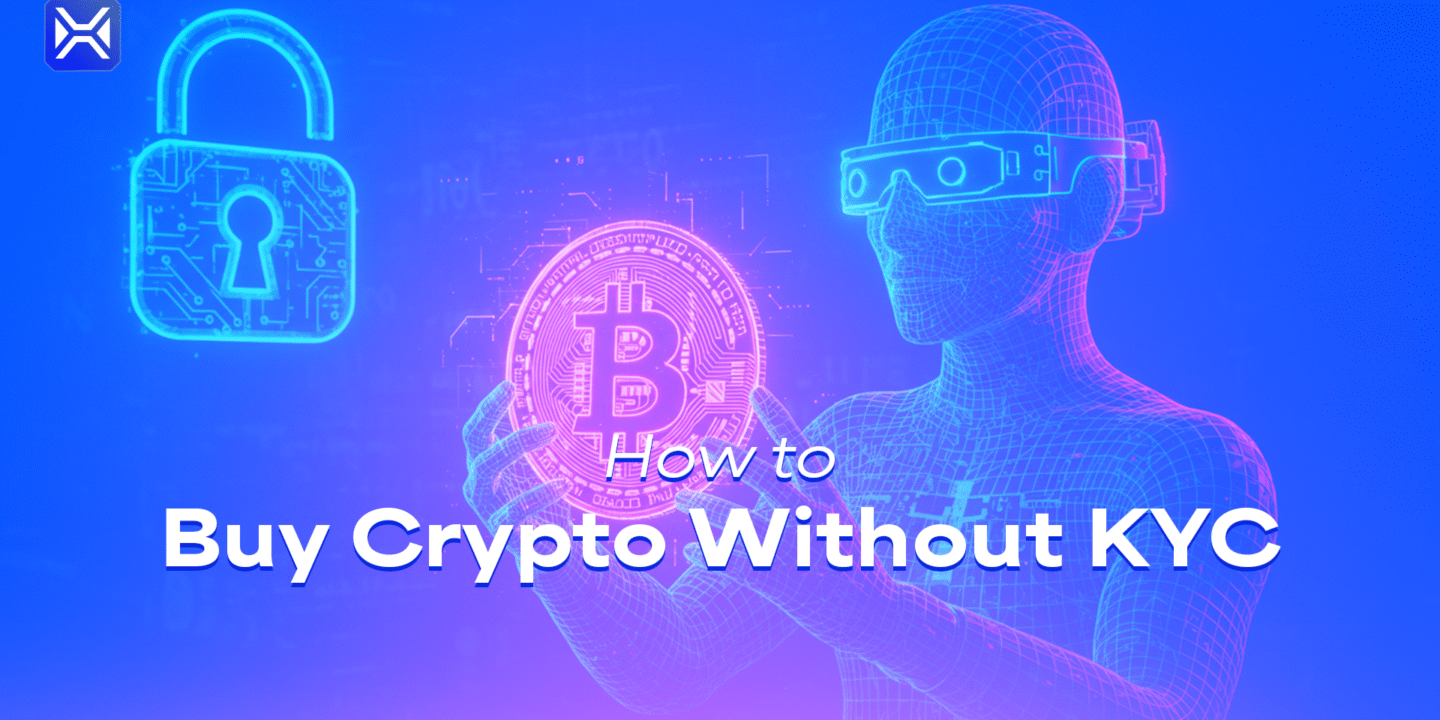
Developing cryptocurrency technology is making it accessible to more people. Transacting in crypto is becoming easy, but it’s not concern-proof. KYC procedures are a major concern for many. Complying with governing laws is good for your safety, but providing your personal information to those platforms may feel counterintuitive to you.
So, is there any way to bypass KYC requirements? This guide will help you understand KYC, the reasons to avoid it, its intended purpose, and the trade-offs involved.
What is KYC?
KYC (Know Your Customer) is a common practice for financial institutions to verify the identity of their clients. They collect personal information such as your name, date of birth, address, and identification numbers for the procedure. The purpose? They aim to assess customer risk and comply with legal requirements to prevent illicit activities.
Why Avoid KYC?
You may consider KYC to be a surveillance tax. It asks you to disclose sensitive personal information — your ID, address, and even selfies. The process can feel intrusive and raises several concerns:
Privacy: Bypassing KYC helps keep your cryptocurrency activities off the corporate and governmental radar. It preserves your financial autonomy.
Account Control: You reduce the risk of exchanges freezing your accounts without KYC. It ensures that you retain unrestricted access to your funds.
However, it does come with trade-offs:
Increased Risk of Scams: Non-KYC platforms may lack stringent security measures. It makes them more susceptible to fraudulent activities.
Limited Customer Support: These platforms often offer minimal assistance. So, you’re on your own in case of any issues.
Tax Obligations Remain: You’re still legally liable to report and pay taxes on your cryptocurrency transactions.
Purpose of KYC
KYC protocols help fight fraud, money laundering, and terrorist funding. Financial institutions can spot and block suspicious activities by verifying customer identities. Centralized exchanges, like Coinbase, must obey these regulations. Or be ready to face severe penalties. Hefty fines and potential shutdowns.
Is KYC Legally Required in the USA?
Yes, for regulated crypto platforms. But you’re not directly obligated to comply as an individual.
Regulatory Framework in the USA
The Bank Secrecy Act (BSA) classifies cryptocurrency exchanges as Money Services Businesses (MSBs). This classification mandates platforms like Coinbase and Kraken to implement anti-money laundering (AML) programs. And that includes Know Your Customer (KYC) procedures.
Consequences for Exchanges Ignoring KYC
Neglecting KYC obligations can cause exchanges to face significant penalties. For instance, the Commodity Futures Trading Commission (CFTC) and FinCEN imposed a $100 million civil monetary penalty on BitMEX in 2021. The reason? Failing to implement AML and KYC measures.
Implications for Users
You can legally purchase and hold cryptocurrencies without KYC using decentralized or peer-to-peer (P2P) platforms such as Bisq and Hodl Hodl. These platforms facilitate direct trades between users without requiring identity verification.
Besides, some Bitcoin ATMs allow purchases without KYC for transactions below certain thresholds. However, larger transactions usually require identity verification.
Recent Developments
The Infrastructure Investment and Jobs Act of 2021 (Section 80603) expanded tax reporting requirements for digital assets. This amendment mandates that brokers report cryptocurrency transactions to the Internal Revenue Service (IRS).
Methods to Buy Crypto Without KYC
Want to purchase cryptocurrency without undergoing KYC procedures? Let’s explore these options in detail:
Peer-to-Peer (P2P) Trading
P2P platforms connect buyers and sellers directly. They let you trade cryptocurrencies without intermediaries. Here’s how it usually works:
Select a Reputable P2P Platform: Choose a platform that supports non-KYC transactions and has a solid reputation.
Browse Listings: Sellers post offers detailing the amount of cryptocurrency available and the desired payment methods.
Initiate a Trade: Once you find a suitable offer, you can initiate the trade.
Complete Payment: Follow the seller’s instructions to make the payment.
Receive Cryptocurrency: The seller confirms payment. Then, the cryptocurrency is released from escrow and sent to your wallet.
Decentralized Exchanges (DEXs)
DEXs facilitate direct cryptocurrency trades between users—no central authority. Better privacy. They operate on blockchain networks and don’t commonly need KYC. Notable DEXs include:
Uniswap: Uniswap allows for various ERC-20 token swapping directly from your wallet.
PancakeSwap: Operates on the BNB Chain. It enables the BEP-20 token trading without KYC.
Using Gift Cards
You may buy crypto with a gift card without KYC. Use platforms like Bitrefill to purchase gift cards with cryptocurrency. Convenient indirect crypto acquisitions. Here’s how:
Go to a local store or online seller. Buy a gift card (Amazon, Steam, etc.) using cash.
Visit platforms like Noones, Paxful, or Bitrefill. Trade your gift card for Bitcoin with a peer directly. No ID needed.
Want even more privacy? Swap that Bitcoin for Monero (XMR) on a decentralized exchange like Uniswap or TradeOgre.
Simple, anonymous, and effective. Just make sure the gift card is valid and unused before trading.

10 Top No-KYC Crypto Exchanges in 2025
You have several options to buy Bitcoin without KYC. Here are ten non-KYC crypto exchanges:
Bisq: An open-source, decentralized exchange. It enables peer-to-peer Bitcoin trading without registration. Users retain control of their funds and personal data.
Hodl Hodl: A global P2P Bitcoin exchange. It doesn’t hold user funds and requires no KYC. Facilitates direct trades between buyers and sellers.
AtomicDEX: A decentralized multi-currency wallet and atomic swap exchange. It allows users to trade multiple cryptocurrencies without KYC.
LocalCoinSwap: A non-custodial marketplace. Supports different cryptocurrencies. Offers multiple payment methods and doesn’t necessitate KYC for trading.
Uniswap: A decentralized exchange on the Ethereum blockchain.Allows you to swap ERC-20 tokens directly from their wallets without KYC.
SushiSwap: Similar to Uniswap. SushiSwap is a decentralized platform. I enable token swaps without intermediaries or KYC requirements.
PancakeSwap: Operates on the BNB Chain. Allows the BEP-20 tokens exchange directly from users’ wallets without KYC.
dYdX: A decentralized exchange. Offers perpetual contracts without KYC. No deposit or withdrawal limits.
AirSwap: Facilitates peer-to-peer trading of Ethereum-based tokens without demanding KYC.
1inch: A decentralized exchange aggregator. Sources liquidity from various DEXs. Lets you swap tokens without KYC.
List of Common Questions and Information Typically Required During a KYC Process
When platforms implement KYC procedures, they typically request the following information:
Full Legal Name: Your complete name as it appears on official documents.
Date of Birth: To verify age and identity.
Residential Address: Proof of current residence, often validated with utility bills or bank statements.
Government-Issued ID Details: Such as passport or driver’s license information.
Selfie or Live Photo: For facial recognition to match the ID provided.
Contact Information: Email and phone number for communication and verification purposes.
Source of Funds/Income: To understand the origin of the funds being used for transactions.
Key Takeaways
The right tools make buying Bitcoin without KYC in 2025 possible. You can trade peer-to-peer, use decentralized exchanges, or even convert gift cards into crypto. Each method gives you more privacy. But with that comes responsibility.
No customer support. No recovery options. And yes, you’re still legally required to report and pay taxes. Always verify the platform, double-check payment methods, and avoid deals that seem too good to be true. Want to stay anonymous? Stick with DEXs and privacy coins like Monero.
Looking for a trusted trading partner? SkyOption offers a secure, transparent platform where you can trade crypto confidently. Know your options, and use them wisely.








No Comments